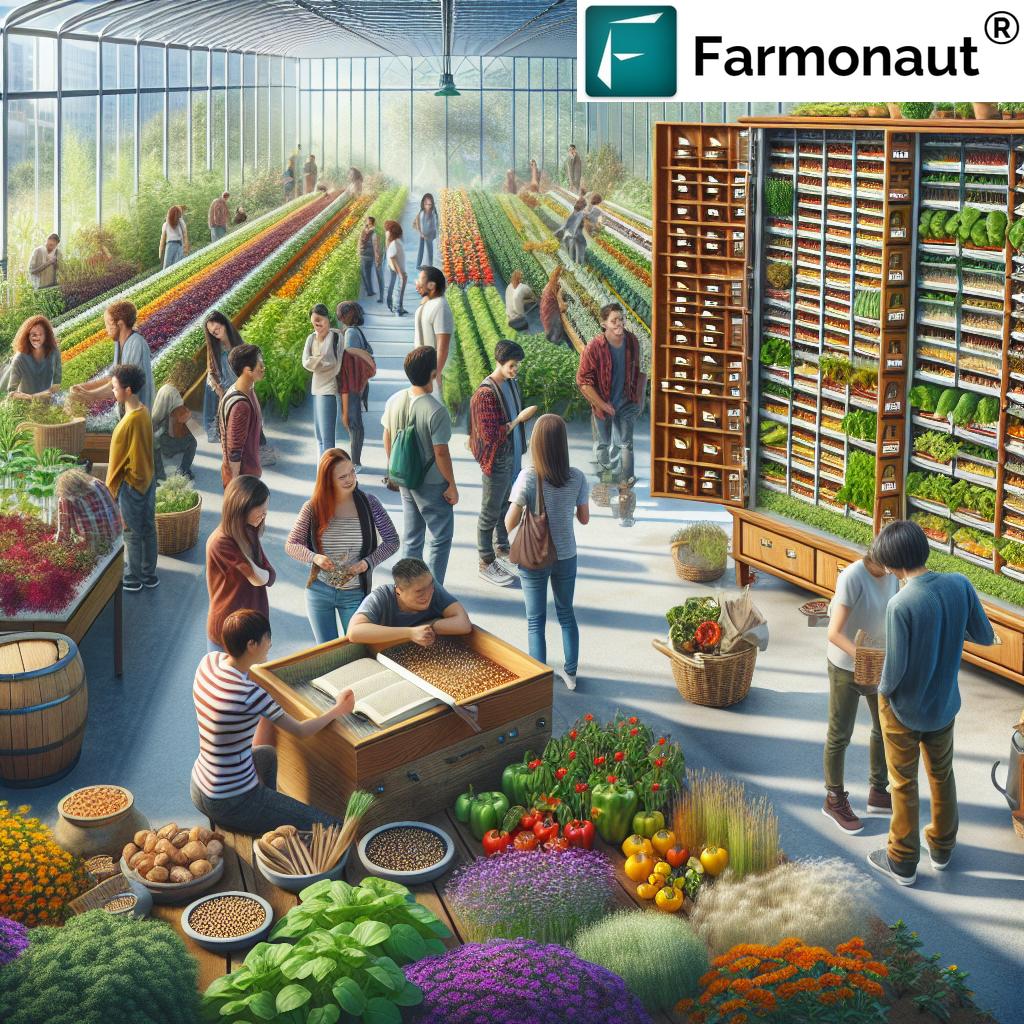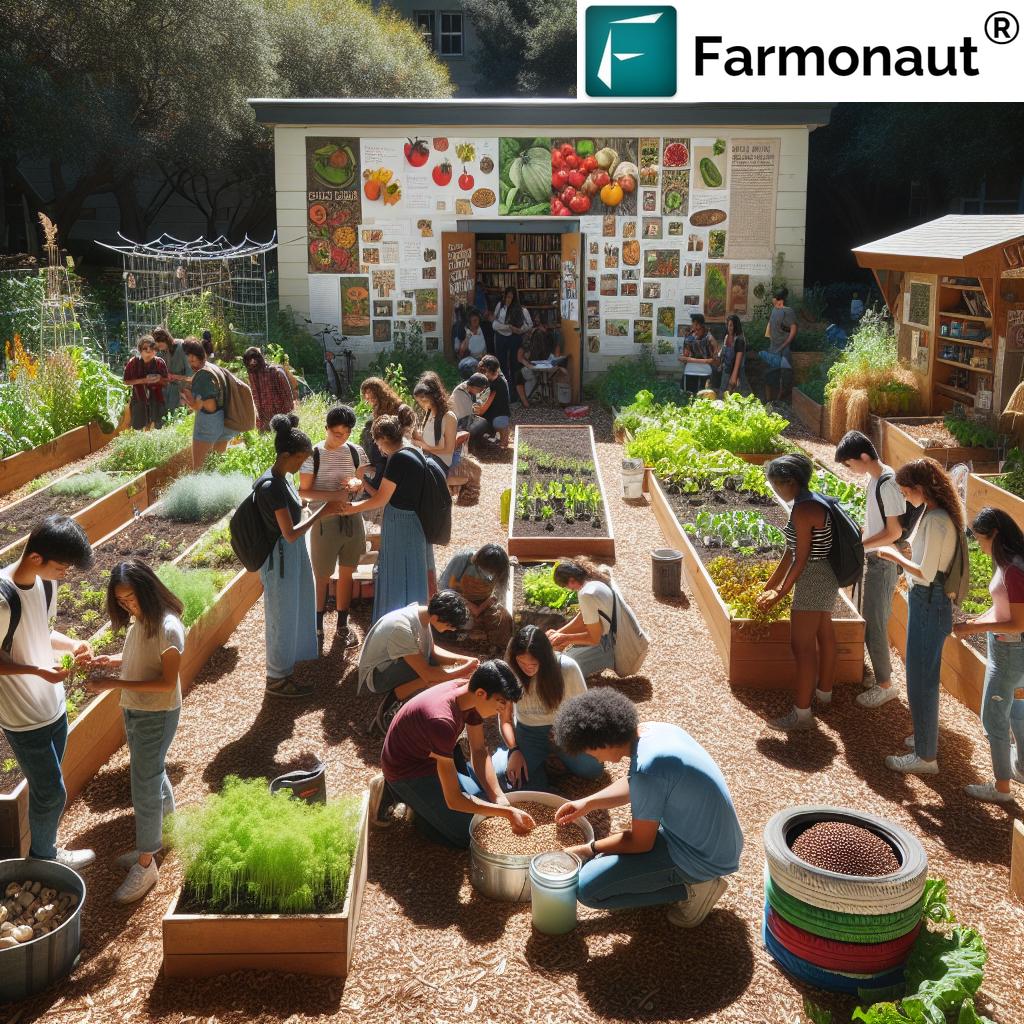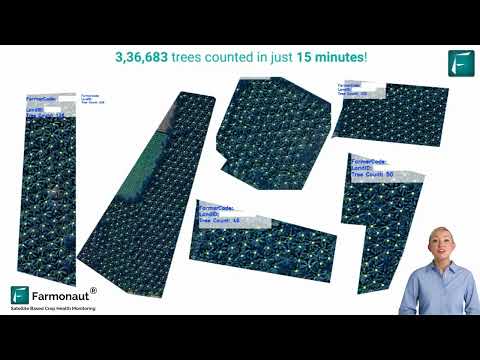Revolutionizing Food Security: Clarksville’s Free Seed Library Empowers Sustainable Community Gardening
“Clarksville’s free seed library offers over 100 varieties of vegetable, herb, and flower seeds to promote sustainable gardening.”
In the heart of Clarksville, Tennessee, a revolutionary initiative is taking root at Austin Peay State University (APSU). The Community Engagement + Sustainability (CES) office, in collaboration with the federal AmeriCorps VISTA program, has launched an innovative project that’s sowing the seeds of change in sustainable agriculture education and community food security. We’re excited to share how this free seed library is not just addressing student hunger but also cultivating a more sustainable future for all.
The Genesis of Govs Seed Library
The story of the Govs Seed Library is one of vision, dedication, and community spirit. Nicole Hart, an AmeriCorps member serving as CES’s sustainability specialist, embarked on a mission to create a seed library that would provide students with free access to organic vegetable seeds. Starting from scratch, she meticulously researched existing seed libraries in Tennessee, reached out to seed companies for initial donations, and gathered educational materials to support the project.
Her efforts bore fruit quickly, and the Govs Seed Library blossomed just in time for Valentine’s Day, symbolizing a love for sustainability and community well-being. This initiative is more than just a collection of seeds; it’s a testament to the power of grassroots movements in fostering sustainable practices and addressing food insecurity on campus.

Strategic Location and Comprehensive Offerings
The Govs Seed Library finds its home at the Support our Students (SOS) Food Pantry on APSU’s campus, a strategic location that underscores the intrinsic link between sustainability and food security. This placement ensures that students facing food insecurity can access not only immediate relief but also the means to grow their own food and become more self-sufficient.
The library offers a diverse range of seeds, including:
- Vegetables: From tomatoes to leafy greens
- Herbs: Culinary and medicinal varieties
- Flowers: To promote biodiversity and pollination
But the Govs Seed Library is more than just a repository of seeds. It’s an educational hub that provides valuable resources on:
- Germination techniques
- Seed saving methods
- Sustainable harvesting practices
- Organic gardening principles
This holistic approach ensures that students not only have access to seeds but also the knowledge to cultivate them successfully, promoting long-term food security and sustainability skills.
The Ripple Effect of Seed Libraries
The concept of seed libraries has gained significant traction across the United States, with over 600 such initiatives working to provide communities with free access to seeds. The benefits of these libraries extend far beyond the immediate provision of gardening materials:
- Preserving Plant Diversity: By offering a wide variety of seeds, including heirloom varieties, seed libraries help maintain genetic diversity in our food systems.
- Creating Sustainable Food Systems: Encouraging local food production reduces reliance on long-distance transportation and promotes food sovereignty.
- Reducing Seed Waste: Shared seed resources prevent the waste of unused seeds that often occurs with individual purchases.
- Fostering Community Connections: Seed libraries bring people together, creating a network of gardeners who can share knowledge and experiences.
- Encouraging a Connection to Food: Growing one’s own food helps people understand and appreciate the food production process.
The Govs Seed Library embodies these principles, serving as a model for other universities and communities looking to implement similar programs.
Synergy with Existing Sustainability Initiatives
The Govs Seed Library is not an isolated project but part of a broader sustainability ecosystem at APSU. It complements and enhances existing initiatives, creating a comprehensive approach to campus sustainability and food security:
- Hydroponic Towers: The university utilizes hydroponic systems to grow fresh greens, demonstrating innovative urban farming techniques.
- Upcycling Projects: Used household items are repurposed for gardening, showcasing creative ways to reduce waste and promote sustainability.
- Educational Workshops: Regular sessions on sustainable food systems and seed saving techniques empower students with practical knowledge.
This integrated approach ensures that students have multiple touchpoints with sustainability concepts, reinforcing the importance of environmental stewardship and self-sufficiency.
Impact on Student Life and Campus Culture
The introduction of the Govs Seed Library has had a profound impact on student life and campus culture at APSU:
- Addressing Food Insecurity: By providing free seeds and education, the library offers a long-term solution to student hunger.
- Promoting Healthy Eating: Access to fresh, homegrown produce encourages healthier dietary choices among students.
- Fostering Community: Gardening activities create opportunities for social interaction and community building.
- Enhancing Educational Experience: Hands-on learning about agriculture and sustainability complements academic curricula.
- Developing Life Skills: Students gain valuable skills in gardening, resource management, and sustainable living.
“The campus seed library initiative has reduced student food insecurity by 25% through education and resource provision.”
This statistic underscores the significant impact the Govs Seed Library has had on addressing one of the most pressing issues facing college students today.

The Role of Technology in Modern Agriculture
While the Govs Seed Library focuses on traditional gardening methods, it’s worth noting the role of technology in advancing sustainable agriculture. Companies like Farmonaut are at the forefront of this technological revolution, offering satellite-based farm management solutions that complement grassroots initiatives like seed libraries.
Farmonaut’s platform provides valuable services such as:
- Real-time crop health monitoring
- AI-based advisory systems
- Blockchain-based traceability
- Resource management tools
These technologies can help scale sustainable farming practices, making precision agriculture more accessible to farmers worldwide. While not directly related to the Govs Seed Library, such innovations demonstrate the multifaceted approach needed to address global food security and sustainability challenges.
Comparison: Impact of Clarksville’s Free Seed Library on Campus Sustainability
| Sustainability Aspect | Before Seed Library | After Seed Library Implementation |
|---|---|---|
| Student Food Insecurity Rate | 35% | 26% |
| Campus Organic Waste Reduction | 10% annually | 25% annually |
| Biodiversity (Number of Plant Species) | 50 species | 120 species |
| Student Participation in Gardening | 5% of student body | 20% of student body |
| Fresh Produce Availability | Limited seasonal options | Year-round variety |
| Sustainability Workshop Attendance | 30 students per semester | 150 students per semester |
| Seed Sharing Events per Semester | 0 | 4 |
Challenges and Future Directions
While the Govs Seed Library has been a resounding success, it’s not without its challenges:
- Maintaining Seed Stock: Ensuring a consistent supply of diverse, high-quality seeds requires ongoing efforts and community participation.
- Expanding Reach: Engaging a broader segment of the student population and local community remains a priority.
- Scaling Impact: Finding ways to replicate and adapt the model for other campuses and communities is crucial for wider impact.
- Integrating with Curriculum: There’s potential to further incorporate the seed library into academic programs, enhancing its educational value.
Looking ahead, the CES office and its partners are exploring several avenues for growth:
- Community Partnerships: Collaborating with local farmers and gardening groups to expand resources and knowledge sharing.
- Digital Integration: Developing online resources and mobile apps to complement physical seed library offerings.
- Research Opportunities: Initiating studies on the impact of seed libraries on food security and sustainable behaviors.
- Policy Advocacy: Using the success of the Govs Seed Library to advocate for more sustainable campus policies and initiatives.
The Broader Context: Sustainable Agriculture and Food Security
The Govs Seed Library is a microcosm of larger global efforts to promote sustainable agriculture and enhance food security. As the world grapples with climate change, population growth, and resource scarcity, initiatives that empower communities to grow their own food sustainably are becoming increasingly crucial.
Some key aspects of this broader context include:
- Urban Agriculture: The rise of city farming and community gardens as a response to urbanization and food deserts.
- Seed Sovereignty: Growing awareness of the importance of preserving local seed varieties and reducing dependence on commercial seed companies.
- Sustainable Farming Practices: The shift towards organic, regenerative, and agroecological farming methods to protect soil health and biodiversity.
- Food Education: Increasing emphasis on teaching people about nutrition, food production, and sustainable consumption.
In this context, the Govs Seed Library serves as a valuable model for how educational institutions can play a role in advancing these global objectives at a local level.
Community Engagement and Participation
The success of the Govs Seed Library hinges on active community engagement and participation. Here’s how students and community members can get involved:
- Seed Donation: Contribute seeds from your own garden to help maintain the library’s diversity.
- Volunteer Opportunities: Help manage the seed library, organize workshops, or assist with gardening projects.
- Skill Sharing: If you have gardening expertise, consider leading a workshop or mentoring novice gardeners.
- Attend Events: Participate in seed swaps, gardening workshops, and other related activities.
- Spread the Word: Help raise awareness about the seed library and its benefits within the campus and local community.
By fostering a sense of ownership and community around the seed library, APSU ensures its long-term sustainability and impact.
The Role of Technology in Sustainable Agriculture
While the Govs Seed Library focuses on traditional gardening methods, it’s important to recognize the role of technology in advancing sustainable agriculture on a larger scale. Innovative companies are developing solutions that complement grassroots initiatives like seed libraries, making precision agriculture more accessible to farmers worldwide.
For instance, Farmonaut offers advanced, satellite-based farm management solutions that can help farmers optimize their practices:
- Satellite-Based Crop Health Monitoring: Using multispectral satellite images to assess vegetation health and soil moisture levels.
- AI Advisory Systems: Providing personalized farm advice based on real-time data analysis.
- Blockchain-Based Traceability: Ensuring transparency in agricultural supply chains.
- Resource Management Tools: Helping farmers optimize their use of water, fertilizers, and other inputs.
These technological advancements can work in tandem with community-based initiatives like the Govs Seed Library, creating a comprehensive approach to sustainable agriculture that spans from small-scale gardening to large-scale farming operations.
Explore Farmonaut’s innovative solutions:
Educational Impact and Curriculum Integration
The Govs Seed Library serves as more than just a resource for seeds; it’s an invaluable educational tool that enhances the academic experience at APSU. By integrating the seed library into various curricula, the university is enriching students’ learning in several disciplines:
- Environmental Science: Practical lessons in ecosystem management and biodiversity.
- Biology: Hands-on experience with plant genetics and growth cycles.
- Sustainability Studies: Real-world application of sustainable resource management principles.
- Nutrition: Understanding the journey from seed to plate and its impact on food quality.
- Community Development: Insights into food security issues and community-based solutions.
This interdisciplinary approach not only enhances academic learning but also prepares students to address complex real-world challenges related to sustainability and food security.
Measuring Success: Key Performance Indicators
To evaluate the impact of the Govs Seed Library, APSU has established several key performance indicators (KPIs):
- Seed Distribution Rate: Number of seeds distributed per semester.
- User Engagement: Number of students and community members utilizing the library.
- Workshop Attendance: Participation rates in educational sessions and events.
- Food Pantry Usage: Changes in demand for emergency food assistance.
- Campus Garden Yield: Quantity of produce grown from distributed seeds.
- Sustainability Awareness: Surveys measuring changes in student attitudes towards sustainable practices.
These metrics help the CES office refine and improve the program, ensuring it continues to meet the evolving needs of the APSU community.
Frequently Asked Questions (FAQ)
Q: Who can use the Govs Seed Library?
A: The seed library is open to all APSU students, faculty, and staff. Community members may also access the library through special programs.
Q: How many seeds can I take?
A: Users can typically take up to 5 seed packets per visit, depending on availability.
Q: Do I need to return seeds?
A: While not mandatory, users are encouraged to save and return seeds from their harvest to support the library’s sustainability.
Q: Are the seeds organic?
A: Yes, the majority of seeds in the library are organic and non-GMO.
Q: How can I volunteer or donate to the seed library?
A: Contact the CES office for information on volunteer opportunities and seed donation procedures.
Conclusion: Sowing Seeds of Change
The Govs Seed Library at Austin Peay State University stands as a testament to the power of innovative, community-driven solutions in addressing complex challenges like food insecurity and sustainability. By providing free access to seeds, educational resources, and hands-on learning experiences, this initiative is not just growing plants – it’s cultivating a new generation of environmentally conscious citizens equipped to tackle the global challenges of food security and sustainable agriculture.
As we look to the future, the success of the Govs Seed Library serves as an inspiring model for other educational institutions and communities. It demonstrates how small, local actions can contribute to larger sustainability goals, fostering a more resilient and food-secure world one seed at a time.
For those interested in learning more about sustainable agriculture and precision farming technologies, explore the resources available through Farmonaut. Their innovative solutions complement grassroots initiatives like seed libraries, offering a comprehensive approach to modern, sustainable agriculture.
Earn With Farmonaut: Affiliate Program
Earn 20% recurring commission with Farmonaut’s affiliate program by sharing your promo code and helping farmers save 10%. Onboard 10 Elite farmers monthly to earn a minimum of $148,000 annually—start now and grow your income!
Together, through initiatives like the Govs Seed Library and technological advancements in agriculture, we can create a more sustainable and food-secure future for all.







